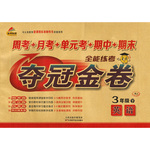题目内容
______ understand fully how film reacts to light, it is necessary to study the chemicals in the film.
A. In order to B. So as to
C. So that D. In order that
练习册系列答案
 夺冠金卷全能练考系列答案
夺冠金卷全能练考系列答案
相关题目
题目内容
______ understand fully how film reacts to light, it is necessary to study the chemicals in the film.
A. In order to B. So as to
C. So that D. In order that
 夺冠金卷全能练考系列答案
夺冠金卷全能练考系列答案